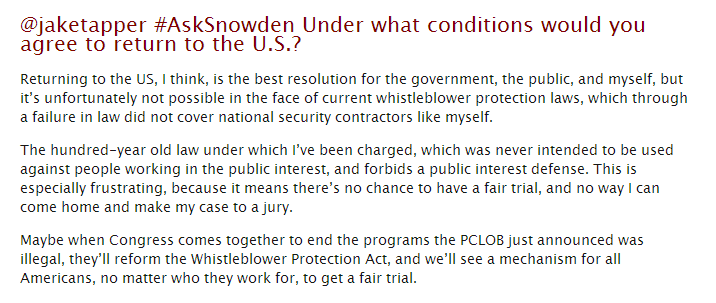Snowden wishes to return to US
In a response to a question from CNN anchor, Jake Tapper…
(From today’s live Q&A with Snowden)

Here’s a synopsis of some notable responses from Snowden…(Don’t miss the last one–it’s epic!)
@mrbass21 Recently several threats have been made on your life by the intelligence community. Are you afraid for your life? Thoughts? #AskSnowden
It’s concerning, to me, but primarily for reasons you might not expect.
That current, serving officials of our government are so comfortable in their authorities that they’re willing to tell reporters on the record that they think the due process protections of the 5th Amendment of our Constitution are outdated concepts. These are the same officials telling us to trust that they’ll honor the 4th and 1st Amendments. This should bother all of us.
The fact that it’s also a direct threat to my life is something I am aware of, but I’m not going to be intimidated. Doing the right thing means having no regrets.
@ferenstein what’s the worst and most realistic harm from bulk collection of data? Why do you think it outweighs national security? #AskSnowden
The worst and happening-right-now harm of bulk collection — which again, is a euphemism for mass surveillance — is two-fold.
The first is the chilling effect, which is well-understood. Study after study has show that human behavior changes when we know we’re being watched. Under observation, we act less free, which means we effectively *are* less free.
The second, less understood but far more sinister effect of these classified programs, is that they effectively create “permanent records” of our daily activities, even in the absence of any wrongdoing on our part. This enables a capability called “retroactive investigation,” where once you come to the government’s attention, they’ve got a very complete record of your daily activity going back, under current law, often as far as five years. You might not remember where you went to dinner on June 12th 2009, but the government does.
The power these records represent can’t be overstated. In fact, researchers have referred to this sort of data gathering as resulting in “databases of ruin,” where harmful and embarrassing details exist about even the most innocent individuals. The fact that these records are gathered without the government having any reasonable suspicion or probable cause justifying the seizure of data is so divorced from the domain of reason as to be incapable of ever being made lawful at all, and this view was endorsed as recently as today by the federal government’s Privacy and Civil Liberties Oversight board.
Fundamentally, a society in which the pervasive monitoring of the sum of civil activity becomes routine is turning from the traditions of liberty toward what is an inherently illiberal infrastructure of preemptive investigation, a sort of quantified state where the least of actions are measured for propriety. I don’t seek to pass judgment in favor or against such a state in the short time I have here, only to declare that it is not the one we inherited, and should we as a society embrace it, it should be the result of public decision rather than closed conference.
@RagBagUSA #AskSnowden what (in your opinion) is the appropriate extent of US national security apparatus? Surely some spying is needed?
Not all spying is bad. The biggest problem we face right now is the new technique of indiscriminate mass surveillance, where governments are seizing billions and billions and billions of innocents’ communication every single day. This is done not because it’s necessary — after all, these programs are unprecedented in US history, and were begun in response to a threat that kills fewer Americans every year than bathtub falls and police officers — but because new technologies make it easy and cheap.
I think a person should be able to dial a number, make a purchase, send an SMS, write an email, or visit a website without having to think about what it’s going to look like on their permanent record. Particularly when we now have courts, reports from the federal government, and even statements from Congress making it clear these programs haven’t made us any more safe, we need to push back.
This is a global problem, and America needs to take the lead in fixing it. If our government decides our Constitution’s 4th Amendment prohibition against unreasonable seizures no longer applies simply because that’s a more efficient means of snooping, we’re setting a precedent that immunizes the government of every two-bit dictator to perform the same kind of indiscriminate, dragnet surveillance of entire populations that the NSA is doing.
It’s not good for our country, it’s not good for the world, and I wasn’t going to stand by and watch it happen, no matter how much it cost me. The NSA and the rest of the US Intelligence Community is exceptionally well positioned to meet our intelligence requirements through targeted surveillance — the same way we’ve always done it — without resorting to the mass surveillance of entire populations.
When we’re sophisticated enough to be able to break into any device in the world we want to (up to and including Angela Merkel’s phone, if reports are to be believed), there’s no excuse to be wasting our time collecting the call records of grandmothers in Missouri.
Snowden ended his live chat with the following: If you’d like more ideas on how to push back against unconstitutional surveillance, consider taking a look at the organizations working together to organize https://thedaywefightback.org/
